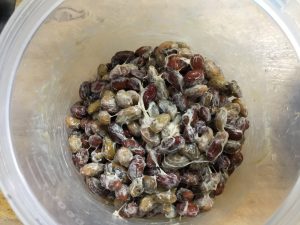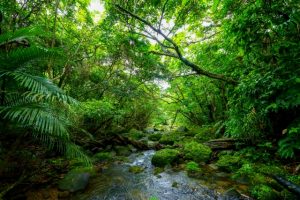Three Reasons Why I Don’t Take Supplements like NMN or Resveratrol
This is a unique scenery in Japan because there is a German theme park with a European-style clock tower behind the rice field. We have a theme park called Blumen Hugel Farm in our neighborhood.
In the field of anti-aging, supplements like NMN and Resveratrol are in the spotlight these days and many people take them. Well, I don’t take them and I have never taken these kinds of supplements in my life including regular dietary supplements. Today, I will tell you why I don’t.
First of all, I am not against supplements. If you like you can take them, and there are people who gain benefits from them. For people who can not exercise or fast, taking supplements can be their alternative. Especially during a pandemic like now, supplements such as 5-ALA are helpful.
You can gain 5-ALA from food such as natto and wine, but the amount you need to suppress infections is very high and you need a supplement for it.
So, why don’t I take them?
From Fiber’s perspective
One of the reasons is that I would like to get nutrients from food as much as possible so that I can absorb fiber as well. As I stated in the post The Ketogenic Diet vs. The Ikigai Diet, the Ikigai Diet is a gut-friendly diet by being a fiber-rich diet. Why do you want to absorb nutrients without fiber when you have a chance to feed your gut microbiomes as well as delivering nutrients to your body?
Is it natural?
Another reason is that I don’t think it is a natural way of absorbing nutrients. People like David Sinclair might argue with me saying nothing in this world is unnatural, over the course of human evolution. While it is difficult to define what natural is, we all know we haven’t been taking nutrients from supplements for a long part of our history, and even today, people in many parts of the world don’t take supplements on daily basis. The centenarians in the Blue Zones don’t, and the centenarians in Japanese Satoyama don’t. We can get enough nutrients from Ma Go Wa Ya Sa Shi I plus grains, so why bother taking pills?
Certainly, the amount of specific nutrient is low in each plant, such as the amount of resveratrol in grapes, and therefore you need to absorb it in the form of a supplement to have an anti-aging effect that is being talked about. I understand this concept, and yet, do we need such a high amount of resveratrol in the first place? Can we not have just a little amount from each food source but a variety of them to have a healthy function in our body? If you are to stop the aging process only from resveratrol, maybe you need a high amount, but resveratrol isn’t the only super nutrient, there are 5-ALA, spermidine, astaxanthin, and many more. By having a wide variety of them even though each one of them is a low amount, along with all kinds of fiber to support our gut microbiota, can we not sustain our body? If you have some severe condition, maybe it isn’t sufficient. In that case, I would ask the question how did you develop such a condition in the first place?
Masanobu Fukuoka, the author of The One Straw Revolution, says that the world is in its state today because we started doing something unnecessary. He was a farmer so he talks about it in the context of farming. It all started when we began cultivating the land, which was unnecessary, the soil was in its perfect condition with diverse microorganisms working inside, but because we dug the land we destroyed the microorganisms. It was a problem for humans, and to fix this problem, we began applying fertilizers to the soil, which created another problem: Plants became susceptible to disease. To fix that problem, we started using pesticides.
Supplements may be able to fix our conditions, but what will we do if they create a new problem?
First, I would go back to the root cause of the problem, and think of ways to change it.
Also, I am not sure if it is good for us to have such a high concentration of one single nutrient at a time. Maybe there is a reason behind a plant containing a small amount of resveratrol or 5-ALA.
Sustainability
The last reason is sustainability. Yes, sustainability again. The Ikigai Diet is designed as a sustainable diet. It has two meanings. One is that we can sustain the diet for a long time. That’s why I made it easy for people to practice by introducing Hare and Ke, and not making any rules. The other meaning is sustainable for the planet. When I think of a system, I think about how to produce all components, too. I know how to grow vegetables, how to grow rice and other grains. I know they can be done organically and locally, or even manually in case if we lose access to petrol to move machinery. How about supplements? How do we make them? Where do we get the ingredients? How much plants or fish or whatever we use do we need to make a bottle? Where do we have to go to find the ingredients? Maybe not locally. Maybe it isn’t that complicated and there are sustainable ways of producing supplements. But before shifting to that path, we can first think of a simpler, maybe a more natural way.
These are the three reasons I don’t take supplements, but as I said before, I am not against them or the global food distribution system. I do eat avocados from time to time, and many of the nuts I consume are not locally grown. Who knows I may be taking NMN and resveratrol at some point. Well, I definitely want to try them to see what happens. We live in a modern world where we rely on the global economy and technology. We should make good use of them when we can. All I am saying is not rely on them too much because we never know when they all collapse. We should create a sub-system in case that happens, and probably the sub-system can benefit us more, since it works on planetary longevity, as well.
The Ikigai Diet: The Secret Japanese Diet to Health and Longevity
POD Paperback
https://www.amazon.com/gp/product/4991064864
Kindle

